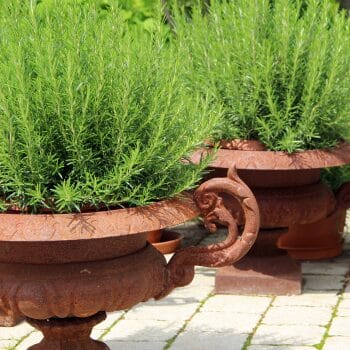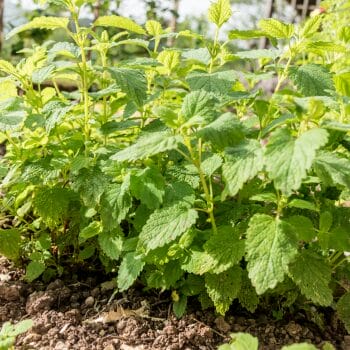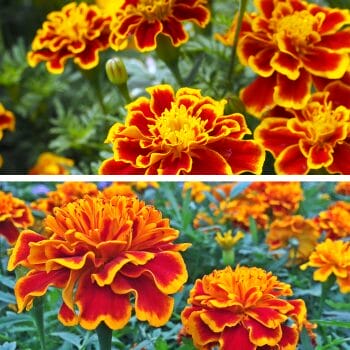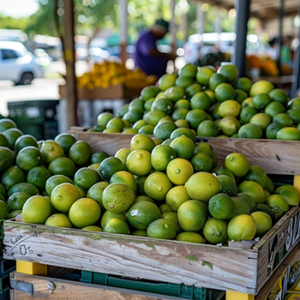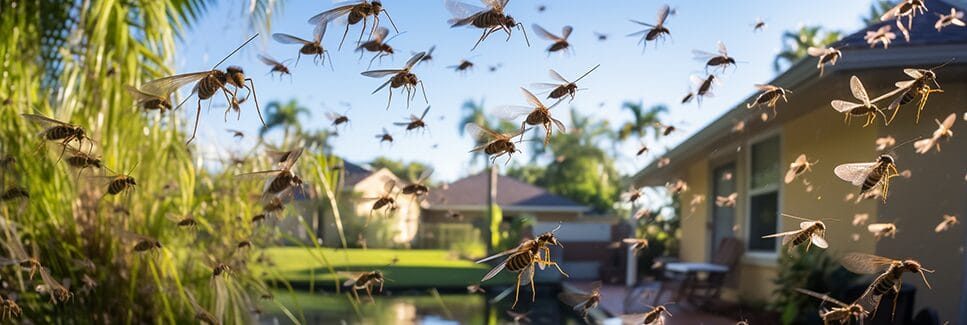
Plants to Repel Mosquitoes in Florida
Florida’s warm, humid climate is a breeding ground for mosquitoes, those pesky insects that leave itchy bumps and can transmit diseases. Using plants to repel mosquitoes in Florida can be part of an effective strategy in avoiding these little monstrous creatures.
Let’s talk briefly about mosquito behavior and avoidance strategies, and then get into the best mosquito-repelling plants for your Florida home.
Understanding Mosquitoes in Florida
Mosquitoes are a year-round problem in Florida, but they are especially prevalent during the warmer months. Here are some key points to understand about mosquitoes in the state:
- Peak Season: Mosquitoes are most active from April to October, with peak activity during the hot, humid summer months.
- Worst Regions: Coastal areas, the Everglades, and regions with abundant water bodies are particularly prone to high mosquito populations.
- Basic Behavior: Mosquitoes are most active at dawn and dusk. They are attracted to standing water where they lay their eggs.
- Mosquito Meals: Mosquitoes are attracted to our body heat, carbon dioxide exhalation, and even lactic acid in sweat.

Ways to Avoid Mosquitoes
- Eliminate Standing Water: Regularly empty containers that collect water, such as birdbaths, plant saucers, and gutters.
- Use Screens and Nets: Keep windows and doors screened, and use mosquito nets if necessary.
- Wear Protective Clothing: Long sleeves and pants can help protect your skin from bites, especially during peak mosquito hours. Light colors are best as mosquitoes are attracted to dark colors.
- Use Mosquito Repellents: There are chemical repellents you can use but if you’re looking for more natural alternatives consider plant-based products that use essential oil of lemon eucalyptus (check out the amazing reviews of Murphy’s Naturals Mosquito and Tick Repellent on Amazon here).
- Plant Mosquito-Repelling Plants: Incorporating plants to repel mosquitoes in Florida yards can be an effective part of a more natural strategy.
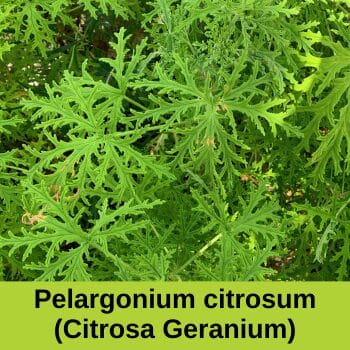
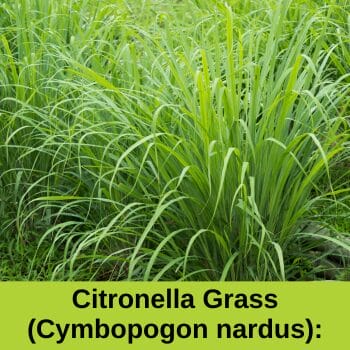
Citronella Plant vs. True Citronella Grass: Clarifying the Confusion:
Many people reach for “citronella plants” as a natural mosquito repellent solution. However, there’s a common misconception!
This section clarifies the difference between the two most frequently encountered plants associated with the term “citronella”:
Citronella Grass (Cymbopogon nardus): This is the true champion when it comes to repelling mosquitoes. The leaves contain citronella oil, which has a strong scent that effectively deters these pesky insects.
Citronella grass thrives in most Florida zones (9A-11) and can be grown in containers on patios or balconies. These make great plants to repel mosquitoes in Florida gardens and backyards. More growing tips below!
Pelargonium citrosum (Citrosa Geranium): Often marketed as a “citronella plant,” this flowering geranium has a pleasant lemony scent, but research shows it has minimal effect on mosquito repellency.
While it might add a nice fragrance to your porch, it’s not a substitute for true citronella when it comes to keeping mosquitoes at bay.
Additionally, Pelargonium citrosum may not survive Florida winters as it prefers warmer zones (10-11) and might need to be brought indoors.
Pelargonium Citrosum: A Lovely Addition, Not a Mosquito Miracle
Pelargonium citrosum, also known as the “citrosa geranium,” shouldn’t be discounted entirely. Here’s what you need to know:
- Beautiful Blooms: This plant offers lovely pinkish-purple flowers and attractive foliage, making it a decorative addition to your patio or porch.
- Pleasant Fragrance: The lemony scent adds a refreshing touch to your outdoor space.
- Limited Mosquito Repellent Effect: While the scent might deter some mosquitoes, it’s not a reliable solution for mosquito control.
Citronella vs. Citrosum conclusion:
If your primary goal is mosquito control, focus on planting true citronella grass or other proven mosquito-repellent plants like lavender, rosemary, or lemon balm.
However, if you appreciate beautiful flowers and a pleasant fragrance, Pelargonium citrosum can still be a lovely addition to your Florida home, just manage expectations about its mosquito-repelling abilities.
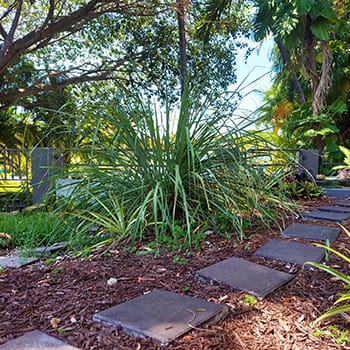
As an Amazon Associate I earn from qualifying purchases at no additional cost to you.
Other Mosquito Repelling Plants and Grasses
Here are some plants known for their mosquito-repelling properties that thrive in Florida’s climate. Each plant has some helpful growing information if you’d like to grow some in your yard or on a sunny patio.
Lemongrass (Cymbopogon citratus)
Lemongrass is closely related to citronella grass and contains citronella oil, the same active ingredient that repels mosquitoes in citronella grass. These are also popular plants to repel mosquitoes in Florida. Here’s a breakdown:
- Mosquito Repellent: Lemongrass leaves contain citronella oil, which has a strong scent that mosquitoes find unpleasant. This scent can interfere with their ability to locate you.
- Similar to Citronella Grass: Both lemongrass and citronella grass are effective mosquito repellents. However, some studies suggest citronella grass might have a slightly higher concentration of citronella oil.
- Use Strategies: Just having lemongrass around isn’t enough. To maximize the effect, you can:
- Crush leaves to release the essential oils.
- Rub them on your skin for a temporary repellent effect.
- Plant them strategically near patios or doorways for a limited zone of deterrence.
Here’s how you can incorporate lemongrass into your mosquito-repellent strategy:
- Plant Lemongrass: Grow lemongrass in pots or borders around your patio or seating areas. This creates a natural mosquito-repelling zone.
- Lemongrass Oil: You can find lemongrass essential oil at most health stores. Dilute it with a carrier oil like jojoba oil and apply it sparingly to your skin for a temporary mosquito repellent.
- Citronella vs Lemongrass: While both work, citronella grass might be slightly more concentrated in citronella oil. Consider planting citronella grass if you have the space.
Overall: Lemongrass is a natural and effective mosquito repellent option, especially when combined with other methods. And the good news? Lemongrass smells GREAT to most humans!!
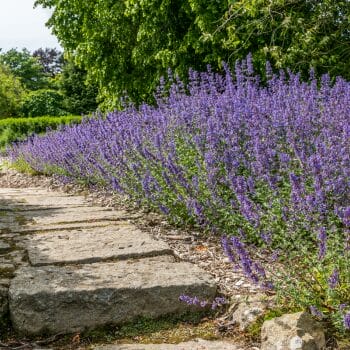
Lavender (Lavandula spp.)
- Zones: Thrives in most Florida zones 8A-11
- Sun: Prefers full sun (at least 6-8 hours of direct sunlight daily)
- Watering: Moderate. Water deeply when the soil feels dry to the touch, but allow for good drainage as it doesn’t tolerate soggy soil.
- Difficulty: Easy to grow.
- Space: Grows 1-3 feet tall and wide, making it suitable for containers, small gardens, or borders.
- Additional Info: Lavender attracts butterflies and bees while repelling mosquitoes. Several varieties are available, with English lavender being a popular choice for Florida.
Rosemary (Rosmarinus officinalis):
- Zones: Does well in most Florida zones 8A-11
- Sun: Full sun (at least 6-8 hours of direct sunlight daily) is ideal.
- Watering: Moderately drought-tolerant once established. Water deeply when the soil feels dry to the touch, but avoid overwatering.
- Difficulty: Easy to moderate.
- Space: Rosemary can grow into a large shrub (3-5 feet tall and wide) if left unpruned. Regular pruning can keep it compact and manageable for containers or smaller gardens.
- Additional Info: Rosemary is a versatile culinary herb and provides year-round fragrance and mosquito repellent benefits.
Lemon Balm (Melissa officinalis):
- Zones: Adapts well to most Florida zones 5-11
- Sun: Prefers partial shade, especially in the hotter afternoon sun.
- Watering: Regular watering is needed, especially during hot weather. Aim to keep the soil moist but not soggy.
- Difficulty: Easy to grow.
- Space: Grows 2-3 feet tall and can spread up to 2 feet wide. Suitable for containers or borders in small to medium-sized gardens.
- Additional Info: Lemon balm is a fast-growing herb that may need occasional trimming to maintain its shape. It attracts pollinators while deterring mosquitoes.
Marigolds (Tagets petula):
- Zones: Adapts well to most Florida zones 5-11
- Sun: Prefers full sun but tolerates partial shade, especially in the hotter afternoon sun.
- Watering: Regular watering is needed, but marigolds are fairly drought tolerant once established. Aim to keep the soil moist but not soggy.
- Difficulty: Easy to grow from seed or transplants.
- Space: Grows 1-2 feet tall and can spread 1-2 feet wide. Suitable for containers, borders, or edging in small to medium-sized gardens.
- Additional Info: Marigolds are known for their cheerful blooms and ability to deter pests, including mosquitoes. They have a strong, pungent scent that repels these insects. Deadheading (removing spent flowers) will encourage continuous blooming throughout the season. The foliage may irritate skin for some people, so wear gloves when handling.
By incorporating these plants into your Florida garden, you can create a more pleasant outdoor environment while naturally reducing the presence of mosquitoes.
Whether you have a large yard or a small patio, there are options to suit every space. Happy gardening!
FAQ
Does aloe vera repel mosquitoes?
There is no scientific evidence that aloe vera repels mosquitoes.
What to eat to repel mosquitoes?
Certain foods, such as garlic, vitamin B1, and lemon eucalyptus oil, may have some mosquito-repellent properties when consumed, but their effectiveness is debated. It’s generally considered more effective to use topical repellents with DEET or other approved ingredients.
What essential oils repel mosquitoes?
Certain essential oils, such as citronella, lemon eucalyptus, and clove oil, may repel mosquitoes. However, they should be diluted properly before applying to the skin and may not be suitable for everyone. Always consult with a healthcare professional before using essential oils, especially for children and pregnant women.
Does jasmine repel mosquitoes?
The sweet scent of jasmine is generally attractive to pollinators like bees, but not necessarily repelling to mosquitoes.





